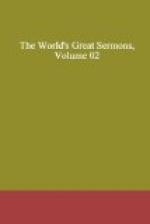These two things being premised, the answer to this objection can not be difficult. For as to the more solid and firm parts of the body, as the skull and bones, it is not, I think, pretended that the cannibals eat them; and if they did, so much of the matter even of these solid parts wastes away in a few years, as being collected together would supply them many times over. And as for the fleshy and fluid parts, these are so very often changed and renewed that we can allow the cannibals to eat them all up, and to turn them all into nourishment, and yet no man need contend for want of a body of his own at the resurrection—viz., any of those bodies which he had ten or twenty years before; which are every whit as good and as much his own as that which was eaten.
Having thus shown that the resurrection is not a thing incredible to natural reason, I should now proceed to show the certainty of it from divine revelation. For as reason tells us it is not impossible, so the word of God hath assured us that it is certain. The texts of Scripture are so many and clear to this purpose, and so well known to all Christians, that I will produce none. I shall only tell you that as it is expressly revealed in the gospel, so our blest Savior, for the confirmation of our faith and the comfort and encouragement of our hope, hath given us the experiment of it in his own resurrection, which is “the earnest and first-fruits of ours.” So St. Paul tells us that “Christ is risen from the dead, and become the first-fruits of them that slept” And that Christ did really rise from the dead, we have as good evidence as for any ancient matter of fact which we do most firmly believe; and more and greater evidence than this the thing is not capable of; and because it is not, no reasonable man ought to require it.
Now what remains but to conclude this discourse with those practical inferences which our apostle makes from this doctrine of the resurrection; and I shall mention these two:
The first for our support and comfort under the infirmities and miseries of this mortal life.
The second for the encouragement of obedience and a good life.
1. For our comfort and support under the infirmities and miseries of this mortal state. The consideration of the glorious change of our bodies at the resurrection of the just can not but be a great comfort to us, under all bodily pain and sufferings.
One of the greatest burdens of human nature is the frailty and infirmity of our bodies, the necessities they are frequently prest withal, the manifold diseases they are liable to, and the dangers and terrors of death, to which they are continually subject and enslaved. But the time is coming, if we be careful to prepare ourselves for it, when we shall be clothed with other kind of bodies, free from all the miseries and inconveniences which flesh and blood is subject to. For “these vile bodies shall be changed, and fashioned like to




